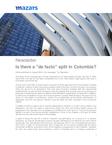
Is there a "de facto" split in Colombia?
The figure of the corporate spin-off was introduced to our legal system through Law 222 of 1995. Since then, the spin-off has been considered one of the most solemn legal figures that exist in Colombian commercial law.
Among such solemnities is that the spin-off project must be approved by the shareholders' meeting or partners' meeting of each intervening company (both of the spin-off and of the spun-off company, when the spin-off is by absorption), that such spin-off project complies with the requirements established by the law and that compliance with the publicity that must be given to the process for purposes of respecting the rights of creditors and bondholders (if applicable) is evidenced. In addition, in order to be completed, the spin-off must be recorded in a public deed (except in the case of S.A.S. where no real estate is transferred), contain the corresponding governmental authorizations (if applicable), and will only become effective once the deed has been recorded in the commercial registry.
In addition to being a solemn act or contract (depending on whether it is a spin-off by creation or by absorption), the spin-off entails a determining effect; the joint and several liability among the participants of the operation for the obligations unfulfilled prior to the spin-off. This joint and several liability is a kind of commercial sanction established in favor of the creditors of the spin-off entity, derived from the natural diminution of their pledge.
In spite of being the spin-off a solemn institution and generating, as a cause of it, a sanction (solidarity), an irregular and dangerous thesis has been developing in the National Tax and Customs Directorate, Dian, according to which there are "de facto spin-offs" or "non-formalized economic spin-offs" which, in spite of not having been born to legal life, for not having complied with the above mentioned conditions, would give rise to all the negative consequences of such institution. Likewise, the Dian has made known some positions in which it indicates that if a company constitutes a subsidiary to develop a related or similar activity to the one developed by the parent company, then it would be incurring in a "de facto spin-off", a situation that would imply that the subsidiary would lose - for example - the benefits of Law 1429/2010 (regulated by Article 5 of Decree 4910/2011), which indicates that small companies resulting from the spin-off of companies existing prior to the aforementioned law may not have such benefits.
Likewise, the Dian could enter to question operations that the same considers as "de facto spin-offs" to determine the passive subjection of the past wealth tax (Art. 3 Law 1739/2014). Despite the dynamism of the law and the preponderance of substance over form, Colombia is still a State of Law and, therefore, institutions must be respected. It is not admissible for the Dian to presume the existence of a "de facto spin-off" when reality shows the contrary and when there are solemn requirements without which such an institution cannot be born to life (ad sustanciam actus requirements). Much less can it do so when, prior to this, the special procedure for abuse in tax matters, as provided in Article 869-1 of the Tax Statute, has not been followed.


